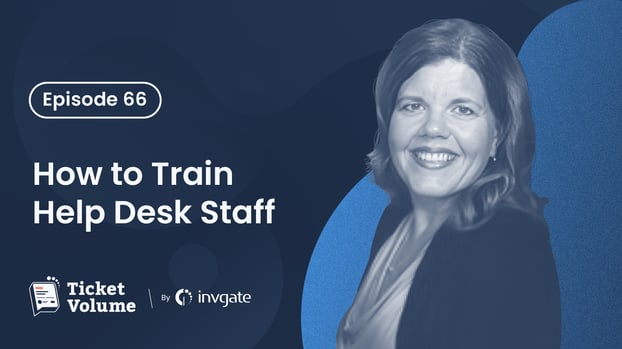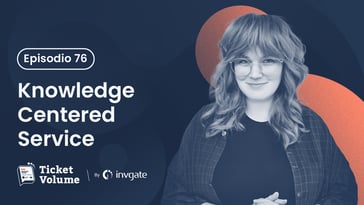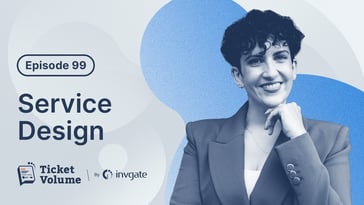Knowing how to train help desk staff effectively can make all the difference in delivering exceptional IT services. In the ever-evolving landscape, where technologies, methodologies, and customer expectations constantly change, proficiently trained help desk teams emerge as the central pillar supporting an organization's IT Service Management (ITSM) strategy.
To dive deep into this crucial subject, we turn to none other than Lisa Schwartz, co-founder of the ITSM Academy, an institution synonymous with excellence in ITSM training for nearly two decades.
On the 66th episode of Ticket Volume, our IT podcast, Lisa highlighted the evolving landscape of ITSM training and delved into modern training methodologies. Her forward-thinking perspective even extended to the future of ITSM, making her the perfect authority to explore the topic at hand.
Continue reading for a brief written summary of the episode – and don't forget that you can register for our monthly live recordings and engage in real-time discussions!

The evolution of help desk training
Over the years, the landscape of help desk training has undergone a significant transformation. Lisa Schwartz has witnessed this evolution firsthand. She pointed out that training used to be primarily classroom-based, where help desk teams were inundated with theoretical knowledge. However, in today's fast-paced IT environment, this approach is no longer sufficient.
The shift has been towards microlearning, a more dynamic and practical approach. According to Lisa, modern training programs now emphasize experiential learning, where help desk staff engage in hands-on activities. This approach allows them to apply their knowledge and problem-solving skills in simulated real-world scenarios.
Maintaining a sense of community
Despite the shift towards microlearning and online training modules, Lisa stressed the importance of not losing the sense of community. In the earlier days of classroom training, there was a strong sense of camaraderie among participants. They shared experiences, learned from each other, and built lasting connections.
In the modern era of digital training, maintaining this sense of community requires a different approach. Lisa suggested incorporating virtual meetups and collaborative projects into training programs. These elements help learners feel connected and foster a supportive learning environment.
|
|
Lisa Schwartz |
How to train help desk staff? Practical strategies
Training your help desk staff requires practical strategies that go beyond traditional methods. Lisa Schwartz mentioned two transformative approaches: simulations and role changes.
1. Harness the power of simulations
Simulations are a game-changing tool in ITSM training, and Lisa Schwartz highlighted their transformative power. They offer a unique and immersive learning environment where help desk staff can enter real-world scenarios without consequences. As Lisa pointed out, this approach enables learners to make mistakes and learn from them, sharpening their decision-making, problem-solving, and communication skills.
Incorporating simulations into your training program creates a risk-free space for your team to gain practical experience and confidence. This hands-on approach bridges the gap between theory and practice, ensuring that your help desk staff is not only well-informed but also well-prepared to handle real-world situations effectively.
2. Embrace role changes for a deeper understanding
Another impactful strategy is to encourage role changes during the learning process. This involves your help desk staff stepping into the shoes of their colleagues, understanding their challenges, and gaining empathy for different roles within the IT service ecosystem. By doing so, learners develop a more holistic view of ITSM, fostering a deeper understanding among team members.
Embracing role changes enhances collaboration and cross-functional knowledge within your help desk team. It encourages individuals to appreciate the intricacies of various roles, leading to more effective communication and problem-solving. This strategy not only strengthens your team's capabilities but also contributes to a more cohesive and agile IT Service Management approach.
Training as an investment
Lisa emphasized that training should be viewed as an investment rather than an expense. Implementing what is learned in training leads to tangible results and benefits for the business. To ensure value from training investments, Lisa recommended the creation of personal action plans for learners. These plans outline short-term and long-term goals related to the training, promoting accountability and progress tracking.
Additionally, regular follow-up sessions, such as virtual brown bag lunches, can be scheduled after training. During these sessions, participants share their progress on personal action plans, discuss achievements, and brainstorm solutions to obstacles. This post-training support ensures that the knowledge acquired is effectively applied in the workplace.
What’s next in ITSM training?
As technology continues to advance, AI-driven solutions will play a more prominent role in managing IT services. Understanding how to integrate these technologies effectively will be crucial for ITSM professionals.
Lisa introduced the concept of ROX (Return on Experience) as a new approach to measuring the value of training and IT services. She emphasized how ROX focuses on the overall experience and impact on both individuals and the organization, moving beyond traditional ROI (Return on Investment) metrics.
|
|
Lisa Schwartz |
The bottom line
This is a concise overview of Lisa Schwartz's appearance on Ticket Volume, but the complete conversation with Matt Beran offers a wealth of additional insights. Be sure to tune in to the entire discussion to gain a deeper understanding of ITSM training!
You can find the complete episode on Apple Podcasts, Spotify, YouTube, or your favorite podcast platform. And don't forget to subscribe if you wish to participate in our monthly live sessions!















